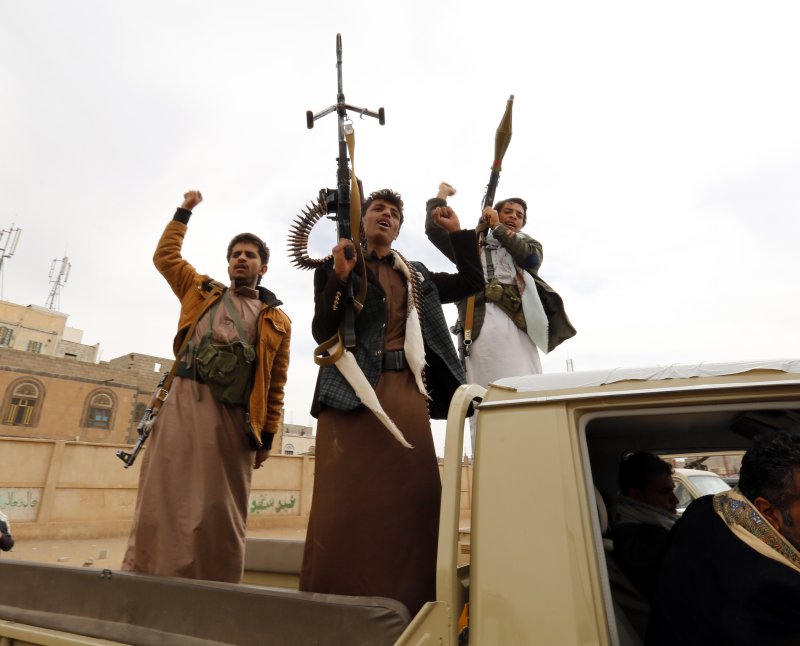Houthi rebels, pictured, and the United Arab Emirates disagree on whether the rebels in Yemen struck a nuclear power plant under construction in Abu Dhabi with a missile. File Photo by Yahya Arhad/EPA
Dec. 3 (UPI) -- Houthi rebels in Yemen said they fired a missile at nuclear power facility in Abu Dhabi, an incident the United Arab Emirates denied Sunday.
The Houthi-affiliated al-Masriah TV reported the ballistic missile was launched at the Barakah nuclear reactor under construction, "successfully hitting its target."
But the United Arab Emirates' state-run news agency WAM said the Houthi claim was untrue.
"UAE possesses an air defense system capable of dealing with any threat of any kind and the project of Barakah reactor is immune," the agency said.
The United Arab Emirates is part of the Saudi-led coalition fighting against Houthi militants and forces loyal to former President Ali Abdullah Saleh. The Houthi-Saleh coalition became shaky last week when Saleh encouraged his supporters to take up arms against the Houthis during clashes in the capital of Sanaa. At least 15 people died in the fighting.
The Houthis and Saleh forces have been fighting against forces loyal to President Abdu Rabbo Mansour Hadi since 2014.
The Saudi-led coalition on Sunday said it would welcome talks with Saleh in order to free Yemen of "militias loyal to Iran." The Saudis have accused Iran of supporting the Houthi effort, which Tehran has denied. The U.S. military, though, said it intercepted a shipment of weapons from Iran headed to the Houthis in 2016.
Saleh said he would be interested in talks if the Saudis lifted a blockade on Yemeni sea ports and airports, and stopped attacks.
"I call upon the brothers in neighboring states and the alliance to stop their aggression, lift the siege, open the airports and allow food aid and the saving of the wounded and we will turn a new page by virtue of our neighborliness," Saleh said in a televised speech.
The Houthis accused Saleh of "treason."
"Do not continue. This act is an act of treason. Shame on them. This is shameful," Houthi leader Abdul Malik al-Houthi said.
Houthi rebels, who represent the country's Zaidi Shiite Muslim minority, fought against the Saleh government periodically from 2004 until his ouster in 2012. With a common enemy in new President Hadi, the Houthis and Saleh's supporters joined forces and the conflict exploded in 2014 and 2015. The rebels forced Hadi to flee the capital to the port city of Aden in February 2015.
The rebel alliance formed a joint government in November 2016, the National Salvation Government.
A coalition of eight Arab countries -- mostly Sunni Muslims -- led by Saudi Arabia took up the fight to restore Hadi to power in March 2015. The United States, Britain and France also support the coalition. The Hadi government controls much of eastern Yemen as well as the southern coast, including the second-largest city of Aden.
The fighting has led to a humanitarian crisis in Yemen, where civilians are facing famine and disease. A Saudi blockade on rebel-held ports in Yemen earlier this month meant civilians already lacking food and medicine found supplies even more scarce. Saudi Arabia reopened some ports last month, but humanitarian organizations said it wasn't enough.
The World Health Organization on Saturday renewed its calls for the Saudis to fully lift the blockade on shipments. The group said a shortage of fuel, food and other essentials has caused prices to skyrocket; in some places, the price of water has increased by 600 percent.
WHO also said struggling health facilities and compromised sewage networks in six main cities could cause a renewed spike in Yemen's cholera epidemic.
This imminent catastrophe is entirely avoidable, but it requires immediate action by the coalition," WHO said. "Together, we call on the coalition to urgently open up all Yemeni Red Sea ports fully and to facilitate the entry and free-flow of humanitarian and vital commercial goods."















